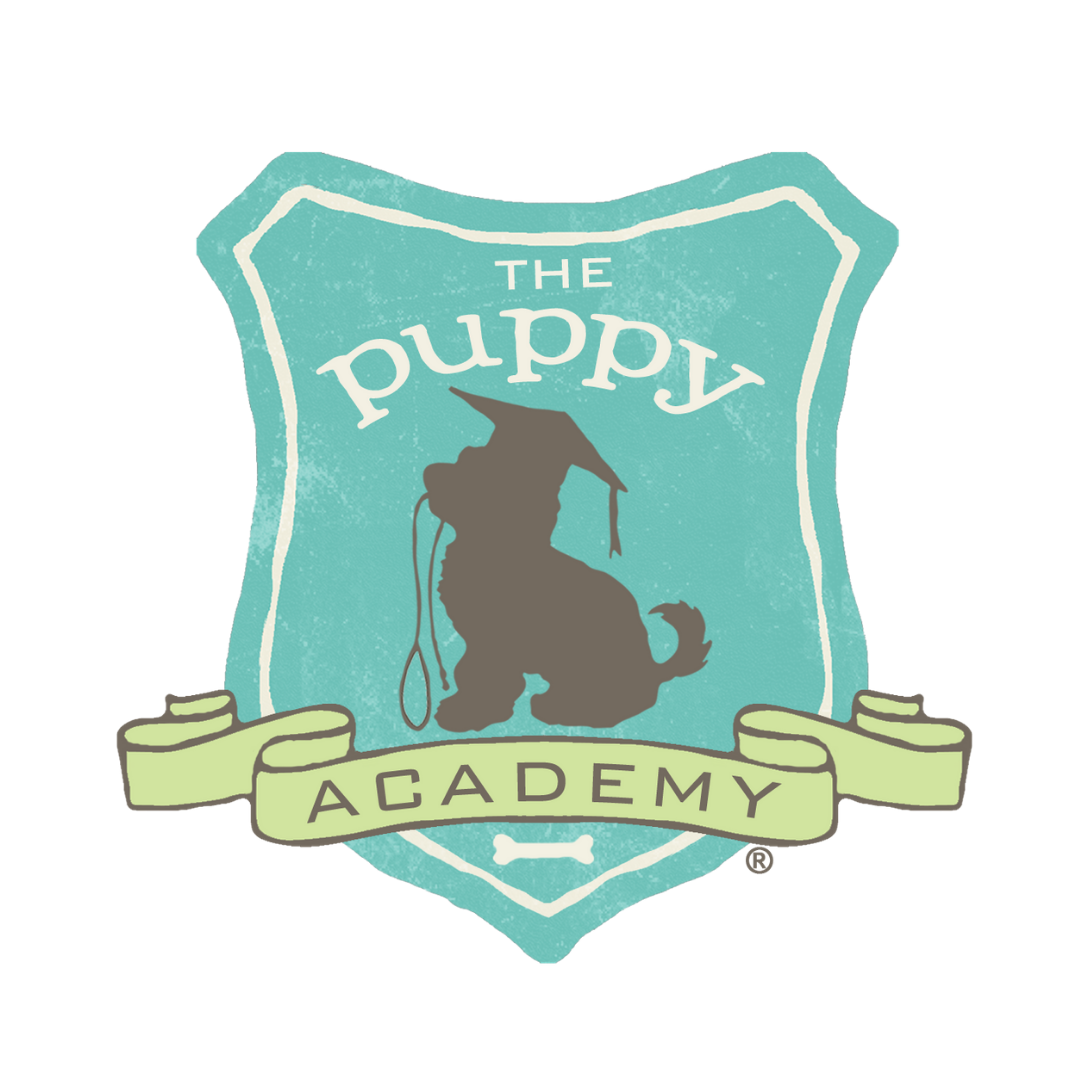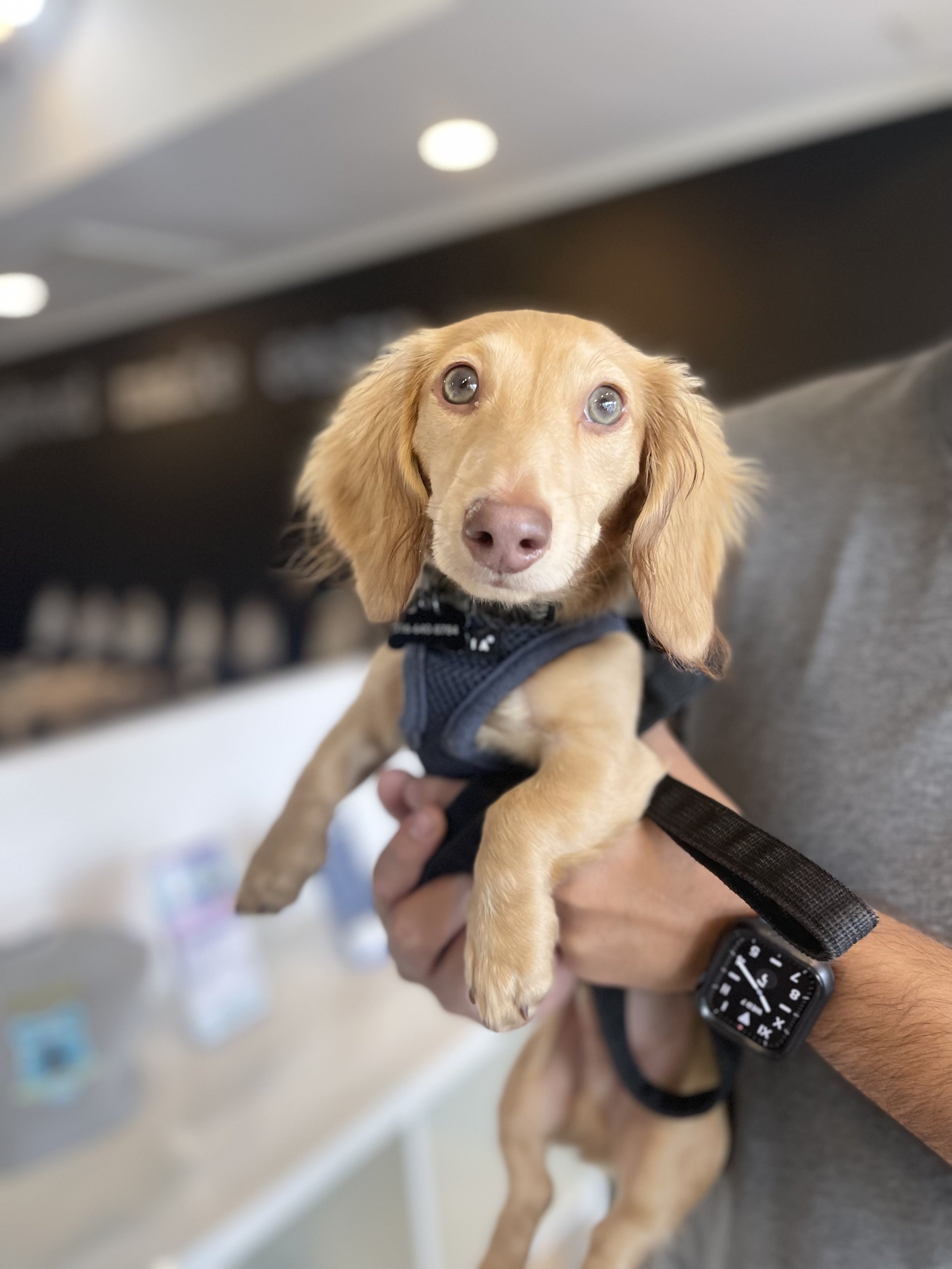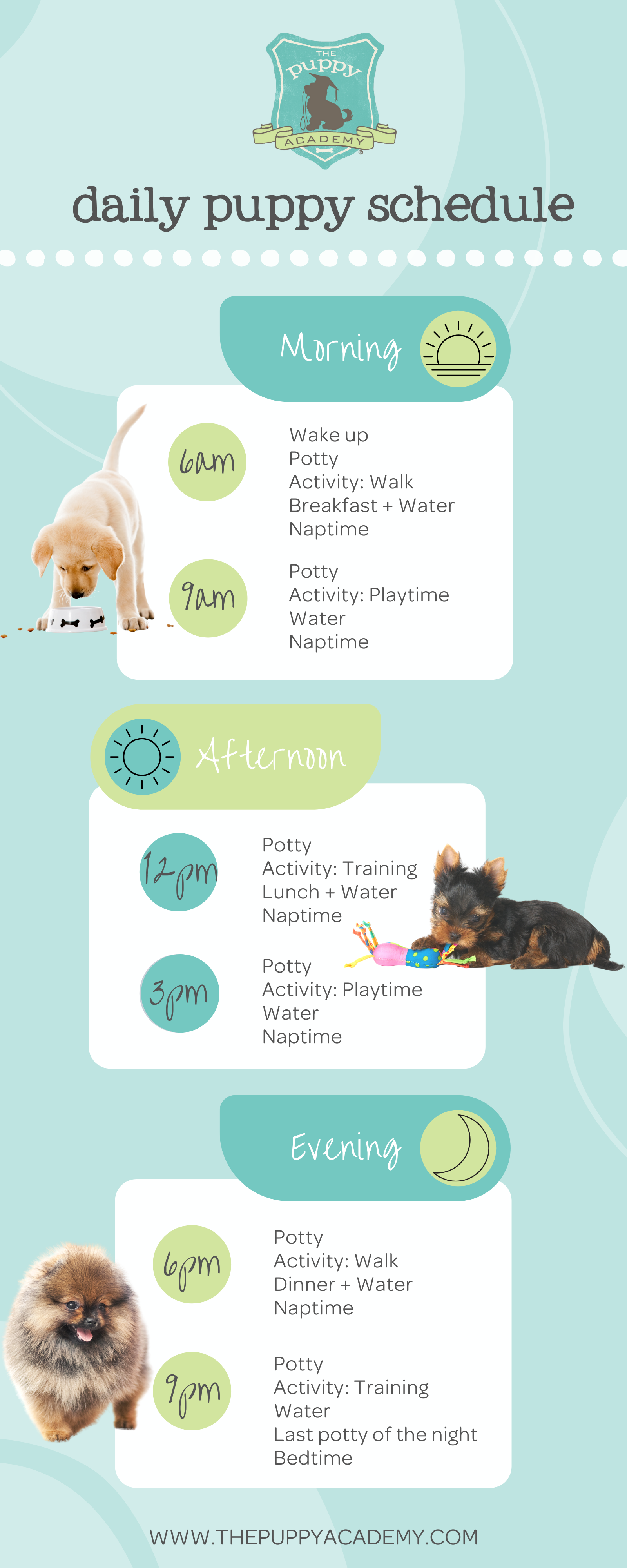Our days are made up of recurring activities, whether it’s having a shower, brushing our teeth, or going to the gym! These routines help us move about our day with ease, and when they’re interrupted (like not getting your coffee before work, yikes!) it can totally throw us off our game. Just like us, puppies thrive on routine, so by following a daily puppy schedule they can easily settle into their new home faster and adapt quickly. It’s up to you to create a new puppy schedule them — this is how you do it!
The Puppy Academy student: Frankie!
So much happens in the first few weeks of your puppy’s new life at home with you: meeting the family, vaccinations, starting puppy training, etc.! One thing that you may have overlooked without realizing it is: setting up a daily puppy schedule.
When does your puppy’s day start? Do you have set mealtimes? What times do they go out to potty? Do you have planned daily playtime or walk times with them? If the answer is no for at least one of these situations, then there’s still some work to do to establish a puppy schedule. Setting up a routine doesn’t mean planning every little moment of your pup’s day for the rest of their life, but it does mean getting some of the important things like potty breaks and feeding on a consistent basis. This will also make YOUR life much easier.
Why Do Puppies Need Schedules?
First, let’s address WHY your puppy needs a schedule.
When a young puppy comes to a new home for the first time, they are trying to understand and adapt to their new environment and family. Incorporating a daily schedule instantly adds structure to your pup’s life! This is especially important for potty training, promoting good eating habits, establishing overall good behavior, and encouraging their confidence and bond with you, their new parent!
Creating a new puppy schedule is really the fastest way to get your pup on track, and it’s one of our greatest “secrets” (that we’re happy to share with you!) to the huge success our students have with their exceptional training results at our puppy school.
A daily puppy schedule makes your puppy’s world more predictable. When puppies know what’s coming up next, they instinctively relax more, knowing their needs are being met (ie. food, play, sleep, etc.). Repeated inconsistencies in their schedule can lead to unpredictable potty accidents, poor eating habits, a puppy that has difficulty settling, and more undesirable behaviors such as increased barking, nipping and even separation anxiety.
Young puppies have a shorter-term memory, so repetition plays a huge role in helping them learn, which a puppy schedule provides for them. The first step is to decide on a schedule that makes sense for everyone in the family and introduce it to your puppy from day one!
To help you, we put together a sample puppy schedule to follow! Use it as a reference to help you know when to schedule in certain activities for your puppy that make sense for your lifestyle. For the new puppy parents who work throughout the day, having a schedule you can hand off to a puppy sitter, or an assisting family member, will be really handy and keep your puppy on track!
Note: Make sure to tailor this schedule based on your own pup, their age, and how long they can hold their potty for, then adjust it as they grow! Need help? Join our Online Puppy School to learn how to tailor the perfect custom schedule for you and your pup!
Sample Daily Puppy Schedule:
Don’t stress if you can’t stick to your schedule exactly, every single day, or if you have some days that look a bit different. As long as you keep falling back to it as much as possible, you’re doing great. Luckily, puppies learn and adapt to routines really quickly so use this to your advantage! Even if your hours may vary, the routine and order of the activities is what’s really key to your puppy falling into a good rhythm.
How to Use Your Daily Puppy Schedule
Potty Break Times: Before you do anything with your puppy, start with a potty break first! In the beginning, your puppy will need to potty more often, be shown where to go again and again to establish the habit of going in the correct spot, and be taught how to “hold it” for longer periods of time as they grow. (The crate can be a big help with this!) Keep in mind that puppies can typically hold their potty longer overnight without as many potty breaks because they’re in a resting state.
As a guideline to determining how ofter to space potty breaks, take your puppy’s age in months and divide it in half to determine how many hours they can hold there for. (Example: A 3-month-old puppy should be taken out every 1.5 hours.) This is a great starting point to build into your daily puppy schedule that you can adjust as your puppy grows and can consistently hold it longer! For a more detailed potty training schedule you can customize for your puppy, visit our blog Puppyhood Made Easy for New Owners: Create a Puppy Potty Schedule!
If you are working during the day, consider hiring a dog sitter or having a family member available who can take your pup out for potty breaks to assist with this process!
Activity Times: After your pup has pottied, it’s time for an activity! We recommend doing a structured activity with your puppy first, like a walk, training session, or interactive playtime, then ending with their own independent activity, like a special toy they love, for any remaining time.
Playtime: Puppies need time to interact with you, get rid of some of that excess puppy energy, and have fun!
This is also a good opportunity to teach your puppy good play manners such as not nipping hands and feet. You can check out our blog How to Play with Your Puppy Pt.1! for some great playtime tips and games. Having some scheduled playtime throughout the day also ensures that you are spending quality bonding time together!
The Puppy Academy students: Coco & Chili!
Walk Time: Take your pup for a 15-20 minute walk around the neighborhood to practice their Heel, and socialize them to the common noises and sounds of the outdoors! For tips on how to teach your puppy Heel, check out our blog Intro to Heel Training to get you started!
If your puppy is too young for walks, hasn’t received their vaccinations yet, or hasn’t learned how to Heel yet, go ahead and start practicing inside your home, in your backyard, and your front walkway! Use the tips from our blog Intro to Leash Walking to help!
Training Time: Incorporating training into your puppy's daily schedule is the cornerstone of nurturing a harmonious and fulfilling relationship. Beyond just teaching good manners and obedience, training is the form of communication between you and your puppy that builds mutual understanding and trust between you, while strengthening your bond.
For an outline of what a new puppy training schedule should look like and what to teach them based on their age, check out our blog: Complete Puppy Training Schedule by Age!
Knowing what and how to train your puppy correctly, ensures not only their safety but empowers them to become well-adjusted, confident, and balanced adult dogs. By investing even a small amount of time daily in training, you lay the foundation for a lifelong journey of shared adventures and incredible memories together!
As a new puppy parent, knowing where to start training and how to do it, without spending hours and hours of watching endless videos and a million ways to do something, can be extremely daunting and confusing. That’s why we created our Online Puppy School specifically tailored to brand new puppy parents like you, to bring you exactly what to do, and how to do it, in the easiest way possible. Get more info here on The Puppy Academy Online School:
Feeding Times: Young puppies typically eat three meals a day so it’s easy to establish this routine on your daily puppy schedule from day one. By the laws of nature, inconsistent eating times (or opting for “grazing” where you leave the food out and allow them to eat whenever they like) often mean inconsistent potty times, which means more accidents! (Same thing applies with water and leaving it down for constant access while they’re puppies!)
Many puppies need to relieve themselves within 30 minutes of eating, while others can go longer, usually, if they’re napping right after or keeping their activity relatively low. Keeping track of what times and how often your puppy generally needs to go potty will help you see patterns and be able to anticipate when they may need to “go” next.
Knowing this information and sticking to the same meal times each day can save you frustrations down the line of dealing with unpredictable potty accidents and difficulty with getting your puppy potty trained quickly.
Naptimes: Believe it or not, a young puppy needs up to 20 hours of sleep a day! Their little bodies are growing up really fast and they can easily get overstimulated and overtired by everything happening around them.
Just like how toddlers become fussy when they get overtired, so do puppies! If you’ve noticed certain times where your puppy is getting extra nippy, barking more, or all of a sudden showing more “bad” behaviors, these are all indicators that it’s time for a good nap!
Schedule out several nap times throughout the day in a quiet area in your house where your puppy can rest undisturbed in their crate or playpen.
In households with small children, you may want to consider “kid-free” times as your puppy naps. This will help your puppy also learn when it’s time to calm and settle down, vs. always go, go, go!
For more tips from our trainers on how to create a daily schedule for your puppy, watch our video here:
Getting your puppy on a consistent schedule is our number one recommendation for new puppy owners because of the huge benefits it has on the pups, how much faster they get acclimated to their new life with you, how much better behaved we see pups on a schedule are vs those that aren’t, and for how much easier and calmer the whole puppyhood process is for new puppy parents when they use it and stick with it!
Create your puppy schedule today and let us know how it goes!
Have more questions about creating a daily schedule for your puppy? Ask our trainers LIVE every Wednesday at 1 pm PT on our Instagram @thepuppyacademy during our Ask A Puppy Trainer Show! All replays are posted afterward, and you can catch up on our last ones on our YouTube channel!
Become a Puppy Academy VIP (Very Important Puppy) to get our latest puppy training tips direct to your inbox, for free, each week!
Looking for the perfect present for the new puppy parent in your life? (Yes, that’s YOU too!) Document all those special puppyhood moments with our official Puppy Memory Book!:
Check out these blogs related to puppy training and more!
How to Calm an Over-Excited Puppy!
Complete Puppy Training Schedule by Age!
How to Care For Your Puppy’s Teeth!







